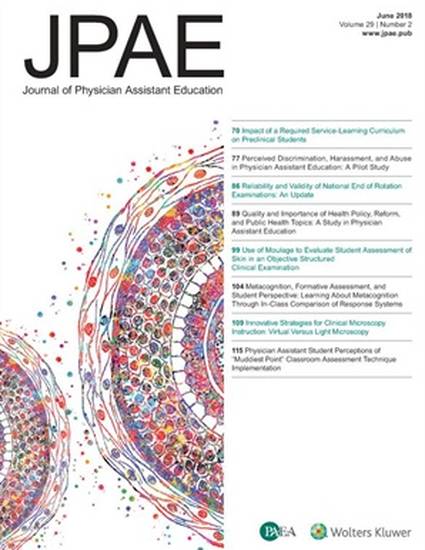
Article
Metacognition, Formative Assessment, and Student Perspective: Learning About Metacognition Through In-Class Comparison of Response Systems
The Journal of Physician Assistant Education
(2018)
Abstract
Purpose
Educators influence learning context through, among other things, triadic reciprocal causation—a behavioral model used in social cognitive theory. Eliciting responses from learners during instruction may contribute to learning by engaging their metacognition. In this study, metacognition was examined based on learners’ experience with 2 different polling methods: student response systems (SRS), commonly known as “clickers,” and a low-technology response system (LTRS), where students raise labeled signs, each with a different response. Scale item results are reported.
Methods
Scales measuring the influence of metacognition from polling methods were administered, following treatment (SRS) and comparison method (LTRS), to first-year physician assistant (PA) students (n = 54). Statistical tests of significance and effect size for each item were compared.
Results
Performance outcomes suggest that the SRS enhances learning experiences more than low-technology polling. Self-reported surveys indicate that self-monitoring, note-taking, and understanding during lectures are significantly improved with the use of clickers. Peer and social comparison items did not demonstrate significance collectively, but survey results indicate that candidates compared themselves to their peers significantly more with the LTRS than with the SRS.
Conclusion
Findings support the practice of using an electronic SRS to poll PA students and enhance learning.
Keywords
- metacognition,
- learning,
- response systems,
- physician assistant
Disciplines
Publication Date
June, 2018
DOI
10.1097/JPA.0000000000000203
Citation Information
Melanie Brady and Christopher Forest. "Metacognition, Formative Assessment, and Student Perspective: Learning About Metacognition Through In-Class Comparison of Response Systems" The Journal of Physician Assistant Education Vol. 29 Iss. 2 (2018) p. 104 - 108 Available at: http://works.bepress.com/christopher-forest/39/
